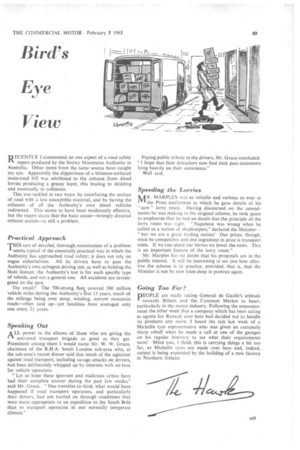Bird's Eye View
Page 71

If you've noticed an error in this article please click here to report it so we can fix it.
RECENTLY I commented on one aspect of a road safety report produced by the Snowy Mountains Authority in Australia. Other items from the same source have caught my eye. Apparently the slipperiness of a bitumen-surfaced main-road hill was attributed to the exhaust from diesel lorries producing a greasy layer, this leading to skidding and eventually to collisions.
This was tackled in two ways: by resurfacing the section of road with a less susceptible material, and by having the exhausts of all the Authority's own diesel vehicles redirected. This seems to have been moderately effective, but the report states that the basic cause—wrongly directed exhaust outlets—is still a problem.
Practical Approach
THIS sort of detailed, thorough examination of a problem seems typical of the essentially practical way in which the Authority has approached road safety; it does not rely on vague exhortations. All its drivers have to pass the Authority's own stringent driving test, as well as holding the State licence; the Authority's test is for each specific type of vehicle, and not a general one. All accidents are investigated on the spot.
The result? The 700-strong fleet covered 500 million vehicle miles during the Authority's first 13 years, much of the mileage being over steep, winding, narrow mountain roads—often iced up—yet fatalities have averaged only one every 21 years.
Speaking Out
ALL power to the elbows of those who are giving the
anti-road transport brigade as good as they get. Prominent among them I would name Mr. W. W. Grace, chairman of the R.H.A. South London sub-area who, at the sub-area's recent dinner said that much of the agitation against road transport, including savage attacks on drivers, had been deliberately whipped up by interests with no love for vehicle operators.
"Let us hope these ignorant and malicious critics have had their complete answer during the past few weeks," said Mr. Grace. "One trembles to think what would have happened if road transport operators, and particularly their drivers, had not battled on through conditions that were more appropriate to an expedition to the South Role than to transport operation in our normally temperate climate."
Paying public tribute to the drivers, Mr. Grace concluded: "1 hope that their detractors now find their past statements lying heavily on their conscience."
Well said.
Speeding the Lorries
A4R. MARPLES was as volatile and verbose as ever at ILL the Press conference at which he gave details of his " new " lorry route. Having discoursed on the amendments he was making to the original scheme, he took pains to emphasize that he had no doubt that the principle of the lorry route was right. " Napoleon was wrong when he called us a nation of shopkeepers," declared the Minister" but we are a great trading nation! Our prices, though, must be competitive and one ingredient in price is transport costs. If we can speed our lorries we lower the costs. This is an important feature of the lorry route."
Mr. Marples has no doubt that his proposals are in the public interest. It will be interesting to see just how effective the scheme is in practice, provided, that is, that the Minister is not by now knee-deep in protests again.
Going. Too Far? • PEOPLE are really taking General de Gaulle's attitude towards Britain and the Common Market to heart, particularly in the motor industry. Following the announcement the other week that a company which has been acting as agents for Renault over here had decided not to handle its products any more, I heard the tale last week of a Michelin tyre representative who was given an extremely sharp rebuff when he made a call at one of the garages on his regular itinerary to see what their requirements were! Mind you. I think this is carrying things a bit too far, as Michelin tyres are made over here and, indeed, output is being expanded by the building of a new factory in Northern Ireland.




















































































































